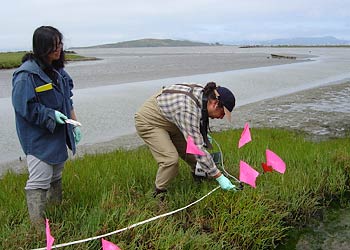 Marine plant physiology informs ocean health and marine conservation: seaweed, cordgrass, and seagrass physiology are sensitive indicators of environmental stress. Ecosystem function depends on marine species diversity and genetic diversity. BML has one of very few labs equipped for marine macrophyte physiological studies. The Williams lab performs physiological research on marine macrophytes (seagrass, cordgrass, seaweeds) to investigate coastal marine plant response to stress. Research in field and lab validate that reflectance and fluorescence provide early warning signs of effects of herbicides in coastal marshes and plant photochemical responses. Plant photosynthesis and nitrogen acquisition are ecosystem functions critical to providing food web support. Physiological research at BML has advanced the understanding of the relationship between a) seaweed species diversity and ecosystem function and b) eelgrass genetic diversity and the ecosystem functions it provides.
Marine plant physiology informs ocean health and marine conservation: seaweed, cordgrass, and seagrass physiology are sensitive indicators of environmental stress. Ecosystem function depends on marine species diversity and genetic diversity. BML has one of very few labs equipped for marine macrophyte physiological studies. The Williams lab performs physiological research on marine macrophytes (seagrass, cordgrass, seaweeds) to investigate coastal marine plant response to stress. Research in field and lab validate that reflectance and fluorescence provide early warning signs of effects of herbicides in coastal marshes and plant photochemical responses. Plant photosynthesis and nitrogen acquisition are ecosystem functions critical to providing food web support. Physiological research at BML has advanced the understanding of the relationship between a) seaweed species diversity and ecosystem function and b) eelgrass genetic diversity and the ecosystem functions it provides.

